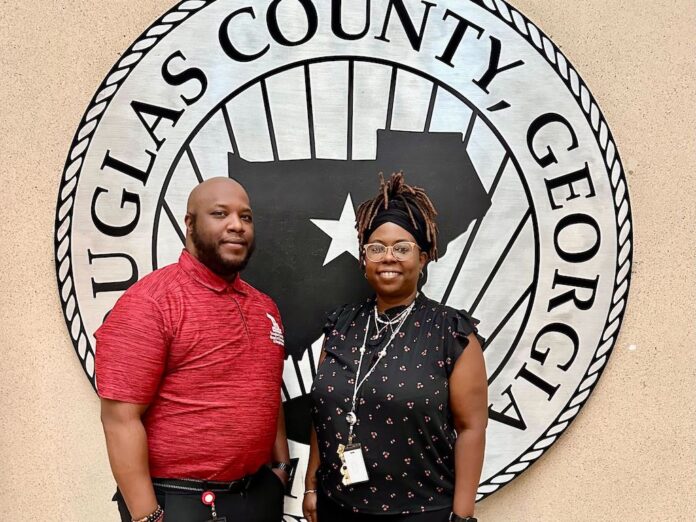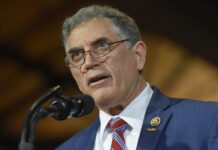
Editor’s note: This story contains profanities and racist slurs.
(Stateline) – When Milton Kidd leaves work at the end of the day, he slips out the back door of the domed Douglas County Courthouse, avoiding the public entrance where people might berate him or demand his home address.
He never takes the same route home two days in a row, and he makes random turns to avoid being followed.
Kidd, a Black man, has a very dangerous job: He is the elections and voter registration director for Douglas County.
“Milton Kidd is a nasty n***** living on tax money like the scum he is,” one voter wrote in an email Kidd shared with Stateline. “Living on tax money, like a piece of low IQ n***** shit.”
Another resident from Kidd’s county of 149,000 west of Atlanta left him a voicemail.
“I don’t know if you’re aware, Milton, but the American people have set a precedent for what they do to f***ing tyrants and oppressors who occupy government office,” the caller said. “Yep, back in the 1700s, they were called the British and the f***ing American people got so fed up with the f***ing British being dicks, kind of like you, and then they just f***ing killed all the f***ing British.”
Kidd smiled incredulously as he shared his security routine and the hate-filled messages that inspired it. He is dumbfounded that he’s the target of such vitriol for administering elections in 2024 — but he knows where it originated.
The lies told by former President Donald Trump, who faces state felony charges for trying to pressure Georgia officials to change the 2020 results, have resonated with many Douglas County voters, Kidd said. Now this nonpartisan official, like many others across the country, is forced to face their ire.
“It’s an idea that has become insidious in the mindsets of Americans, that because a single individual did not win an election, that now I can behave like this,” said Kidd, who has a thick beard and wears a thumb-size crystal on a black string around his neck.
As he prepares for the next presidential election, Kidd said he will continue to press his state’s elected officials for more leadership and money to protect him, his staff and the democratic process.
“If this office fails, then our democracy has failed,” he said. “I will never let a detractor who calls with vile language deter me from the work that I do.”
Like standing in a puddle of gasoline
Kidd is far from the only election official who has faced threats inspired by the lies of Trump and his allies, who continue to claim without evidence that the 2020 presidential election was stolen.
Nationally, 38% of local election officials have experienced threats, harassment or abuse since 2020 just for doing their jobs, according to a survey released in May by the Brennan Center for Justice, a voting rights nonprofit housed at the New York University School of Law. More than half of the over 900 respondents said they are concerned about the safety of their colleagues and staff.
Kidd’s colleagues in neighboring counties also have felt the hostility.
In the green hills of Bartow County, a rural community in northwest Georgia, Election Supervisor Joseph Kirk has taken steps to protect himself, though he won’t disclose specifics. While harassment has not reached the level it has in other counties, he said he has lost staff members who left their positions because of the changed atmosphere.
“There’s a lot more animosity now,” he said in his Cartersville office, a red-brick building 4 miles from Main Street.
Cobb County Director of Elections Tate Fall is also fortifying her suburban Atlanta elections office. In the coming weeks, her office will install a shatterproof safety film on the glass that shields the front desk. More access points will require key cards for entry, and there will be additional panic buttons.
“It’s very surreal,” she said. “In the office, people have become so desensitized to people yelling at them that they don’t consider a lot a threat anymore.”
At least a dozen states have enacted new protections for local election officials in recent years, including boosting criminal penalties for those who threaten or harass them.
This month, Georgia officials announced a first-in-the-nation requirement that all new police officers undergo a course on election security, partly focusing on protecting election officials from threats.
This is part of a broader mission to build more coordination between sheriff’s offices and elections offices, said Chris Harvey, deputy executive director of the Georgia Police Officer Training and Standards Council, which will lead the effort.
Harvey, a former detective, also served as Georgia’s state elections director for six years, including through the 2020 presidential election.
After the January 2021 U.S. Senate runoff, he was doxed — his home address and a picture of his house were posted online. He also received an emailed death threat that included a photo of him with crosshairs over his face.
While he says he wasn’t worried about his safety, he did worry about his wife and four children at home. He called the local police, who posted a car in front of his house for two weeks.
“In this supercharged environment, it’s like standing in a puddle of gasoline,” he told Stateline. “Anything can set it off. It didn’t used to be like that.”
The democratic path
Democracy’s fragile promise has always been part of Kidd’s life.
Kidd, 39, grew up in East St. Louis, Illinois, a former manufacturing hub of 18,000 people along the Mississippi River.
His family was part of the Great Migration, moving north from Southern states such as Arkansas and Mississippi looking for work and safety. But shortly after his ancestors’ arrival, white mobs killed hundreds of Black newcomers during several months of 1917, displacing 6,000 Black people in the southern Illinois city.
His grandmother was a sharecropper in Luxor, Arkansas, and instilled in his mother the importance of voting. Growing up, he heard stories about civil rights activists Fannie Lou Hamer, who was beaten for registering voters, and Medgar Evers, who was assassinated. It made Kidd a student of history, able to recite the Declaration of Independence and parts of the Constitution.
“The importance of the ballot box has always been something that has been stressed to me,” he said. “I know in my own family individuals have tried to register to vote and had dogs sicced on them. These are not words in a book. It’s not that far off.”
Inspired by his father, who left school in the ninth grade to work, and his mother, who received a college education later in her life, Kidd earned his master’s degree in public administration from Southern Illinois University Edwardsville in 2010.
He then did what he called a “reverse migration” back to the South to begin working elections in various counties in the Atlanta area, including Douglas County. He started there in 2015 and was promoted to lead the office three years later.
In that time, Kidd has seen the election environment turn nasty.
“We’ve reshaped this nation into an uglier, vile, vitriolic spirit that we’re just allowing to continue to manifest,” he said last month.
He and his eight full-time staff members have attempted to bolster their public standing by going to local churches, fairs and political party meetings of both parties to share details about how they run elections and tabulate the vote securely.
But he needs more resources from the state. The same lawmakers who wink and nod at the lie that massive fraud is stealing elections do not support additional funding for local election administration, he said, especially for the safety of election administrators.

Every one of the security enhancements he made to his office — including a series of magnetic locks on the doors — came through outside grant funding, a practice the state later outlawed in 2021.
Some of Kidd’s staff members have quit, and he’s finding it hard to fill the temporary positions that allow elections to run smoothly. Constant turnover can lead to errors, which leads to more distrust. The workers who have stayed are still fearful.
“On election night, my husband definitely waits for me to get home,” said Tesha Green, the county’s deputy elections director. “You have to always make sure that no one’s there when we’re leaving out the door.”
Kidd was encouraged by Georgia’s announcement that it would require all new police officers to undergo a course on election security. Does Kidd feel supported by his local sheriff’s office? He chuckled and said there’s a lot more that could be done.
Cpt. Trent Wilson of the Douglas County Sheriff’s Office said the office took Kidd’s complaints seriously. Though they were concerning, he said, there was nothing criminal in the voicemails and emails Kidd received.
“It was very distasteful,” Wilson said. “But just because they’re distasteful don’t mean they’re criminal.”
Pressed about what constitutes a threat, he added: “Look, I’m a Black man. So, we don’t like to be called a n*****. But calling someone a n***** is not a crime.”
When election season comes, he said the sheriff’s office boosts security, adding more deputies to the courthouse. Visitors already must pass through metal detectors, he noted.
As head of the election office, Kidd knows he’s a target, and he’s accepted that. But he worries about his staff, many of whom are older women who don’t feel safe walking to their cars at night. And, closer to home, he worries that if something happens to him, no one will be able to take care of his beloved dogs, Kleo and Knight.
“In 2024, I work a job that I have to allow myself to be called a n*****,” he said. “But I do it because I want to make sure people have access to the ballot box.”
Stateline is a Georgia Recorder sibling news outlet and part of the States Newsroom network.







